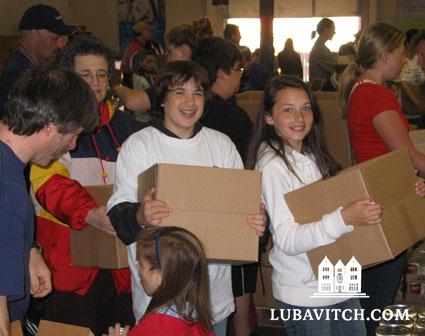(lubavitch.com) Soaring food and gas prices that are forcing working people to seek help to feed their families are also putting the squeeze on food banks. In these tough times, Chabad run food banks are employing creative strategies to feed those in need.
Bring together 600 volunteers to pack 2450 boxes full of canned goods in 50 minutes and you get a well oiled, decibel-shattering experience. Outside Jewish Relief Agency’s warehouse on June 8, muscle bound brothers from a local fraternity are hustling boxes into trucks while tots and teens and their parents, seniors and crutch-bound school kids load still more cardboard boxes with fifteen pounds of canned tuna, potatoes, beans, noodles, pasta sauce.
Established in 2000 by Lubavitch House of Philadelphia, JRA began with three guys and a list of nineteen families in need. The list soon grew and grew. With the current economic and commodity price crunch, executive director Amy Krulik has seen the number of calls for food help rise from 15 a week to 70.
“We see a lot of people who were sitting close to the edge, able to cover their bills but barely. With gas over four dollars a gallon, they can’t make ends meet. They have to choose between getting to work and feeding their families,” said Krulik.
JRA is not alone. Last month, America’s Second Harvest – The Nation’s Food Bank Network released the results of a survey that said out of 180 food banks, 99% have seen an increase in the number of clients.
With the price of eggs up by 24% and flour up by 69% compared to last year, it’s no wonder more people need help. Overall, the U.S. Department of Agriculture estimates that the cost of food – grocery store bought – will have increased by 6%. It’s the biggest jump in food prices since 1990.
In Montreal, Chai Center’s food bank, which distributes over 100 tons of food each year, higher food costs has had serious ramifications. A good portion of Chai Center’s food comes from manufacturers willing to donate food as a charitable way to unload misprinted boxes. Cost of business increases mean that food producers are being extra careful to avoid printing mistakes, limiting the amount of food available to the food bank.
Until Passover, “things were okay,” said Rabbi Yossi Kessler, director of the Chai Center. Now the food bank is feeling the impact of corporate belt tightening. Last year at this time, the food bank stocked staples like flour, juice, cereal, canned vegetables, crackers, cookies. Today, the canned food is limited to real basics like tuna and condiments. “We’re working hard to keep the shelves stocked.”
With more mouths to feed, the food banks are nowhere near giving up. This week, Rabbi Kessler worked out a deal with a flourmill, and soon there will be sacks lining the food bank’s shelves.
He’s also working on a deal with kosher food companies to buy their products at or below cost and sell them at a fraction of retail in a subsidized store. A store would help families too mortified to take a handout, get the food they need in a dignified manner.
JRA has worked out other means of surmounting obstacles. Inflation has meant that the state food grants do not have as much value as before. The organization has developed relationships with manufacturers to buy the food circling close to the expiration dates at the same or better prices offered to middlemen who supply bargain “dollar stores.”
Still, Krulik said, “Whenever I hear that food prices have gone up, again, it breaks my heart” and motivates her to make yet another call to secure more food for those in need.

Be the first to write a comment.